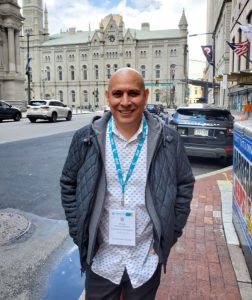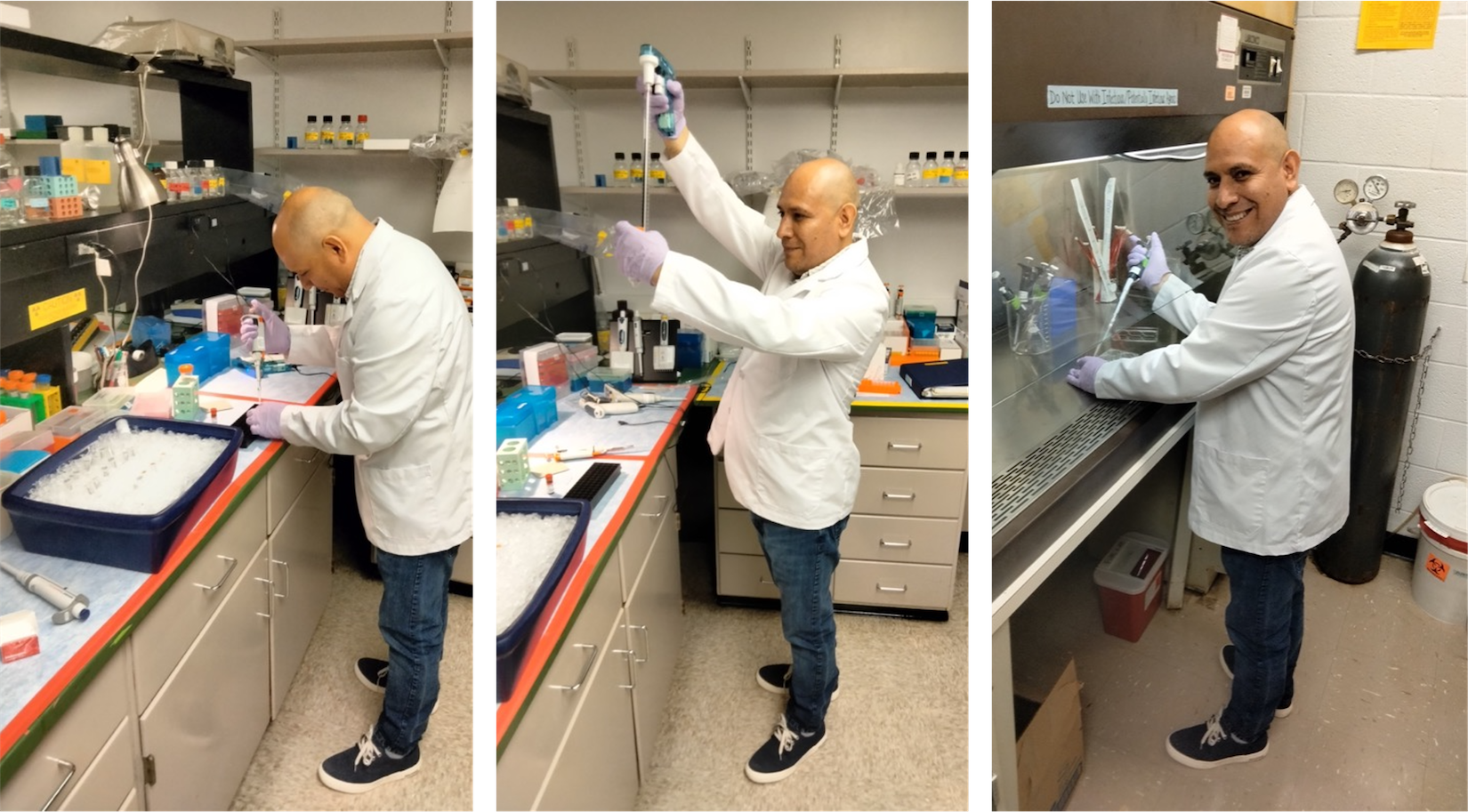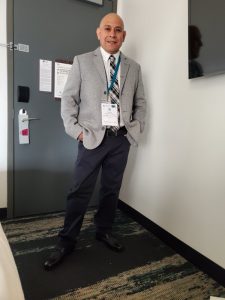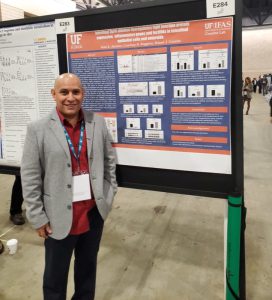 We are pleased to welcome Felix Jimenez Rondan, a postdoctoral associate working in the lab of Dr. Robert Cousins, to the Discover FSHN Series! Felix is dedicated to studying nutritional genomics and is currently researching the role of zinc in human health in the Food Science and Human Nutrition Department at the University of Florida.
We are pleased to welcome Felix Jimenez Rondan, a postdoctoral associate working in the lab of Dr. Robert Cousins, to the Discover FSHN Series! Felix is dedicated to studying nutritional genomics and is currently researching the role of zinc in human health in the Food Science and Human Nutrition Department at the University of Florida.
In this post, learn more about his current work in zinc and metabolic disorders, his inspiration for pursuing nutritional genomics and human genetics, and simple-yet-powerful advice for all readers.
Would you tell me about your current work as a postdoctoral associate?
I am working on understanding the mechanisms by which ZIP14 (a protein that transports metal ions into organs) maintains intestinal barrier permeability. In addition, I’m studying the body’s metabolic response to pro-inflammatory stimuli and its influence on specific transcription factors through epigenetic modifications.
In general, our lab is investigating how zinc can influence metabolic disorders through intestinal tissue and, ultimately, using this information to develop new therapeutic targets. Our preliminary data show that ZIP14 ablation causes an increase in transcription factors occupancy in the promoter of lncRNAs and reduces HDAC activity on intestinal cells.
Zinc is an essential nutrient for human health. Lack of zinc transporters like ZIP14 may cause intestinal permeability and reduce nutritional zinc uptake. Understanding this process is important because zinc deficiency is common in developing countries. Also, zinc deficiency has been associated with complications during pregnancy, susceptibility to infections, development of cardiovascular diseases, and impaired growth and development in children.

Will you share how you chose the FSHN department at UF for your postdoctoral work?
Before moving to the FSHN department at UF, I was working in Dr. Arthur Beaudet‘s lab at Baylor College of Medicine studying a carnitine transporter (SLC6a14) and the relationship between carnitine deficiency and autism. When searching for a postdoctoral position, I looked for labs that were doing similar research in SLC transporters and found Dr. Robert Cousins‘ lab, which is the most prestigious lab in the field of zinc research.
I was already trained in most of the techniques that Dr. Cousins was looking for in a prospective postdoctoral associate. For example, I was familiar with mouse work, RNA seq and bioinformatic, wet-lab work techniques, and specific techniques like CHiP assay and intestinal organoid culture. Also, I was moving from a state where I used to commute for three hours every day, and I liked the idea of living really close to campus.
Tell me about what you did before coming to UF.
Farming was the main source of income for my parents. Their work inspired me to pursue genetics in crop science. At first, I obtained my B.S. in agricultural science. My college in Peru offered limited opportunities to do research in genetics. Therefore, I decided to obtain further training at a university in the US. I studied English intensely so I could read and communicate well.
It is really important to understand how zinc affects those diseases and physiological functions. To support public health, supplemental zinc may be necessary for individuals in many developing countries.
After learning English, I enrolled in a master’s program in genetics and biotechnology at Brigham Young University. While at BYU, I worked with Dr. Eric “Rick” Jellen in population genetics and orphan crops. I also worked with Dr. Peter J. Maughan to develop SNP’s and SSR’s molecular markers via genomic reduction, barcoding, and 454- pyrosequencing.
How did you become interested in human genetics?

My interest in genetics shifted when I found out that my best friend’s son was diagnosed with a gastrointestinal birth defect. At the time, I had no experience in human genetics, but I have always been fascinated by the topic. I read everything I could about congenital disorders. One area that fascinated me was how doctors and scientists use genetic information to prevent, diagnose, and treat diseases. This application encouraged me to pursue human genetics and eventually nutritional genomics.
Eager to learn more about congenital diseases, I volunteered in the NICU at Timpanogos Regional Hospital. Also, I read several papers about research and new therapies for premature babies or babies with congenital diseases. I was impressed with how these tiny babies, some weighing less than a pound, can thrive.
After this volunteer experience, I completed my Ph.D. in physiology and developmental biology at BYU working in Dr. Paul Reynolds‘ lab. We studied pulmonary genetics, development, and diseases. One of my projects was studying the role of the CLDN6 gene in lung development. I was the first to characterize a precise temporal-spatial pattern of CLDN6 expression during embryo development. Not only did this experience introduce me to the use of mouse models to study developmental disorders, but it also prepared me for what I hope to be a lifelong pursuit to understand prenatal diseases and nutritional genomics.

What do you believe are the most important facts the public should know about your research area?
Zinc is essential for the smooth functioning of the immune system. On the other side, zinc deficiency is linked to chronic diseases like diabetes and high blood pressure. It is really important to understand how zinc affects those diseases and physiological functions. To support public health, supplemental zinc may be necessary for individuals in many developing countries.
What do you want to do in your career long term?
My plans involve building an independent research program in nutritional genomics, which is the study of how diet may affect the expression of genes or epigenetic modifications. I would like to build an externally-funded research program that involves graduate and undergraduate students. While I’m open to moving to any location, I would like to stay in Florida.
What do you like to do in your free time?
Mostly, I play Android games like Crashlands developed by Butterscotch Shenanigans. I also read books by authors like James Patterson and James Rollins. My favorite book is The Judas Strain by James Rollins.
Anything else you’d like to add?
My advice is simple: do your best and work hard.
Interested in learning more about FSHN’s Nutritional Sciences programs? Read more here and here and here!
P.S. The Discover FSHN Series highlights the unique experiences of UF’s Food Science and Human Nutrition students, faculty, staff, and alumni. Want to read more about the amazing work going on in the FSHN department? See our previous features below:
Undergraduate Students:
Shannon Mai, Dietetics
Alex Colon, Dietetics and Jenny Duong, Food Science
Jackie Shannon, Nutritional Sciences
Jennifer Jordan, Food Science
Lily Tucciarone, Dietetics
Tim Cassella, Nutritional Sciences
Graduate Students:
Savanna Curtis, Food Science (M.S.)
Carley Rusch and Matthew Beke, Nutritional Sciences (Ph.D.)
Alexa Hosey, Dietetics (MS/DI)
Vicnie Leandre, Food Science (M.S.)
Rufus Theophilus, Nutritional Sciences (Ph.D.)
Amber Fritsche, Dietetics (MS/DI)
Amy Jones, Food Science (Ph.D.)
Melissa Perez Santana, Food Science (M.S.)
Postdoctoral Associates:
Dr. Cameron Bardsley, Food Safety
Dr. Tautvydas Shuipys, Food Safety
Faculty:
Dr. Naim Montazeri, Food Science/Food Virology
Dr. Jeanette Andrade, Dietetics
Dr. Zhiyong Cheng, Nutritional Sciences
Dr. Juan Andrade Laborde, Global Nutrition
Dr. Razieh Farzad, Food Science
Dr. Beth Gankofskie, Dietetics
Dr. Anne Mathews, Nutritional Sciences
Staff:
Sharyn Passeretti, Lab Specialist
Herschel Johnson, Manager of Student Services
Brandy Johnson, Administrative Assistant
Alumni:
Dr. Rebecca Gould, Dietetics, Postdoctoral Research
Dr. Becca Solch, Nutritional Sciences, Postdoctoral Research
Hannah Cooper, Dietetics, Private Practice
Dr. Richie Li, Food Science, Product Development
Doctor Brian Barrow, Nutritional Sciences, Medicine/Physician
Luciano Junoy, Food Science, Product Development
Carlin Dixon, Dietetics and Professional Dance
P.P.S. Learn more about FSHN’s renowned programs below!
Undergraduate Programs:
Dietetics
Food Science
Nutritional Sciences
Graduate Programs:
M.S. Dietetic Internship Program
M.S. Food Science and Human Nutrition
Ph.D. Food Science
Ph.D. Nutritional Sciences
 1
1
